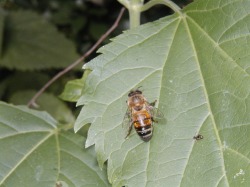10 ways you can help bees

1. Become a beekeeper
Beekeeping is a most enjoyable, fascinating and interesting hobby. Every year local beekeeping associations run courses to help new people take up an explore beekeeping and even help them find the equipment they need and a colony of bees. Training programmes continue to allow enthusiasts to become Beekeepers. For information on courses visit your local beekeepers association website.
2. Help to protect swarms
Swarming is a natural process when colonies of honeybees increase their numbers or need a new home. If you see a bee swarm contact me or another local beekeeper who will collect the swarm and take it safely away. Honeybees in a swarm are usually very gentle and present very little danger. They can be made aggressive if disturbed or sprayed with water. Just leave them alone and wait for a competent beekeeper to arrive.
3. Plant your garden with bee friendly plants
In areas of the country where there are few agricultural crops, honeybees rely upon garden flowers to ensure they have a diverse diet and to provide nectar and pollen. Encourage honeybees to visit your garden by planting single flowering plants and vegetables. Go for all the allium family, all the mints, all beans except French beans and flowering herbs. Bees need a lot of pollen and trees are a good source of food. Willows and tulip trees are exceptionally good. Here is two links for a list of plants for honeybees, List #1, List #2. The Delaware Department of Agriculture has leaflets on bee friendly trees and shrubs. Click here for one now.
4. Stop using pesticides, try natural insect control
Each time you use a pesticide outdoors, some bees are affected. Bees travel from flower to flower and lawn to lawn and sometimes pickup pesticides in their travels. This over time is stored in the bees wax and leads to poor bee health.
5. Ask your congressman to improve research into honey bee health
Beekeepers are very worried that we do not have enough information to combat the diseases that affect honeybees. The loss of bee colonies has been in the news, perhaps you saw the 60 minutes segment. The english honeybee is also in serious trouble, Learn more here. Without additional research we could lose our honeybees within ten years. Write in support of bee research today.
6. Find space for a beehive in your garden
Bee hives come in many styles and shapes and can be any color. Many would-be beekeepers, especially in urban areas, sometimes find it difficult to find a safe space for their colony of bees. Did you know there are few if any restrictions to having bees? They can be located high in trees or off a patio or deck. If you have some space, contact your local beekeeping association and they could find a beekeeper in need of a site or help you to try beekeeping. It is amazing what a difference a beehive will make to your garden. Crops of peas and beans will be better, more tomatoes and fruit trees will crop well with fruit that is not deformed and your garden will be the best!
7. Make sure you buy real honey
Read the jar carefully, If it contains any added sugars or syrups its a phony. If its made by bees it is honey, if its made by or from something else its not honey. Don't be fooled by "flavored" corn syrup. If you eat at Popeye's chicken they serve fake honey, read the bag.
8. Encourage local authorities to use bee friendly plants in public spaces
Some of the country's best gardens and open spaces are managed by local authorities. Recently these authorities have recognised the value of planning gardens, roundabouts and other areas with flowers that attract bees. Encourage your authority to improve the area you live in by adventurous planting schemes. These can often be maintained by local residents if the authority feels they do not have sufficient resources.
9. Learn more about this fascinating insect
Beekeeping is fascinating. Honeybees have been on this earth for about 25 million years and are ideally adapted to their natural environment. Without honeybees the environment would be dramatically diminished. Many zoos, such as Brandywine Zoo in Wilmington, Delaware have bee exhibits where you can learn more and see bees up close. Invite a beekeeper to come and talk to any local group you support and give an illustrated talk about the honeybee and the products of the hive. Honeybees are a part of our folklore and are one of only two insect species that are managed to provide us with essential services.
10. Bee friendly
When kept properly, bees are good neighbors. Bees usually fly much higher (10-14 feet) in the air than you might think. If a bee hovers inquiringly in front of you or lands on you, do not flap your hands or swat at it. Stay calm and either wait a moment (don't blow on it) or simply move slowly away, best into the shade of shed or a tree. The bee will soon lose interest in you. It is worth remembering that bees do not like the smell of alcohol on people, the "animal" smell of leather clothing, even watch-straps. Bees regard dark clothing as a threat – you could be a bear! Bees are sometimes confused by scented soaps, shampoos and perfumes, best avoided near the hive.
